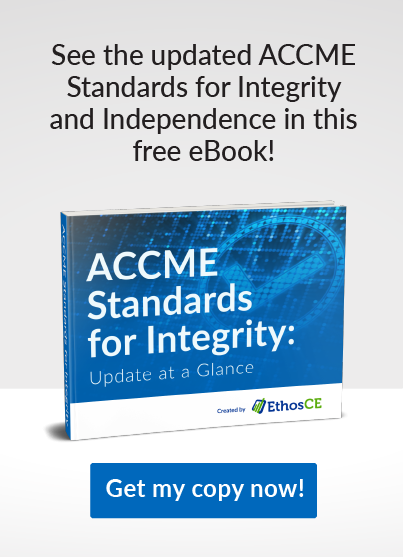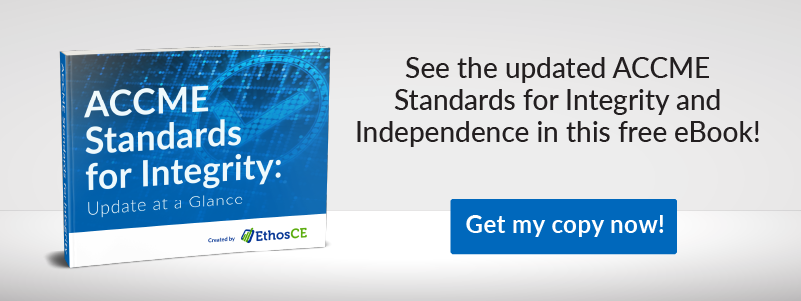ACCME Conflict of Interest: 4 Things to Know
The ACCME is firm when it comes to conflicts of interest. They’ve created a clear separation between accredited continuing education and conflicts of interest.
They expect you to closely examine any individual who has a financial relationship with an established ACCME conflict of interest to see if the person has any opportunities to control continuing education content that’s related to this relationship. As a result, the ACCME is concerned about how these relevant financial interests involving an individual stemming from an “ineligible company” could increase this relationship for their own gain, particularly if they serve as planners, faculty, or presenters for continuing education.
With this in mind, ACCME’s new Standards for Integrity and Independence in Accredited Continuing Education work to continuously make sure certain individuals are free from commercial influence of any type.
Here, we provide you with four takeaways about the ACCME’s conflict of interest.
1. The Critical Players: Your Planners and Faculty
Your planners, speakers, and faculty are the critical players when it comes to your continuing education. It’s crucial that they work in a completely open and honest way when it comes to an ACCME conflict of interest.
Many healthcare professionals have financial relationships with ineligible companies. This is to be expected. However, their relationships cannot be allowed to influence your accredited continuing education.
With the new Standards, there are major changes regarding how disclosures are addressed. Planners, faculty, and speakers were previously requested to disclose their financial relationships with ineligible companies from the past twelve months. That’s been changed. Now, anyone who will serve as an event planner, faculty, or speaker must disclose all their relationships from the past twenty-four months. They will also need to provide you with the name and nature of their financial relationship(s); however, they don’t need to disclose any spouse or partner financial relationships. That said, they must disclose all their relationships regardless of the potential relevance of each relationship to the educational activity.
2. Valid Content: Balanced and Fair
As an accredited provider, it’s up to you to make sure your education is fair and balanced. Clinical content must be balanced and only presented to ensure patient safety and effective care.
When it comes to your continuing education content, all recommendations for patient care must be based on existing science, be evidence-based, and have clinical logic. In this way, healthcare professionals can receive fair and balanced views of diagnostic and therapeutic choices. An accredited continuing education activity is the place to discuss, debate, and explore new and evolving topics from faculty who represent a range of opinions and perspectives. Their presentations should provide balanced and objective views of current research and treatment options.
Those with an ACCME conflict of interest could potentially slant their presentations. They should only teach about the merits and limitations of a therapeutic or diagnostic approach. An activity’s learning goals should be clearly communicated. For example, learners may be told how to use a particular therapy and ask questions, but they should not be told how to administer the therapy with a product that the presenter is associated with.
3. Accepting Commercial Support
Your accredited continuing education organization is responsible for making sure you remain independent of an ineligible company. Any planner, faculty member, or presenter relationship must not result in an ACCME conflict of interest that stems from accepting commercial support. It’s defined as the practice of ineligible companies paying directly or indirectly for any expenses related to your education or your learners. This means you must not allow conflicts of interest when it comes to travel, lodging, or personal expenses for any learners.
If you choose to accept commercial support—that is, financial or in-kind support from ineligible companies—you’re responsible for ensuring that your education remains independent of the ineligible company and that the support does not result in an ACCME conflict of interest.
4. The Thirty-Minute Rule: Live Continuing Education Activities
According to the new ACCME Standards, you must ensure that your learners can easily distinguish between accredited education and other activities.
When it comes to your live continuing education activities, you must be sure that any marketing, exhibits, or nonaccredited education developed by or with the influence from ineligible companies or planners or faculty with conflicts of interest are only held thirty minutes before or after an accredited education activity. If you do have such activities, they must be clearly labeled and identified as such. This thirty-minute rule is required for all activities, whether they’re taking place in person or online. According to the ACCME, for your live, online activities, if your learner remains in the same “virtual space” for a nonaccredited session, then it’s up to you to ensure that there is an interval before or after the accredited education activity.
Putting It All Together
There are several areas of concern when it comes to an ACCME conflict of interest surrounding your continuing education. Knowing how the Standards for Integrity and Independence in Accredited Continuing Education work is a must when it comes to understanding what you must do to make sure your learners receive their education without the existence of conflicts of interest.
At EthosCE, we understand the challenges of staying up to date and compliant with ACCME changes. We know how critical it is to get things done right the first time when it comes to team-based education and success.
To learn how EthosCE can enhance the continuing education of your healthcare teams, schedule a free 1-on-1 demo with one of our specialists today!
 We're now part of the Cadmium product suite! Learn more
We're now part of the Cadmium product suite! Learn more 


